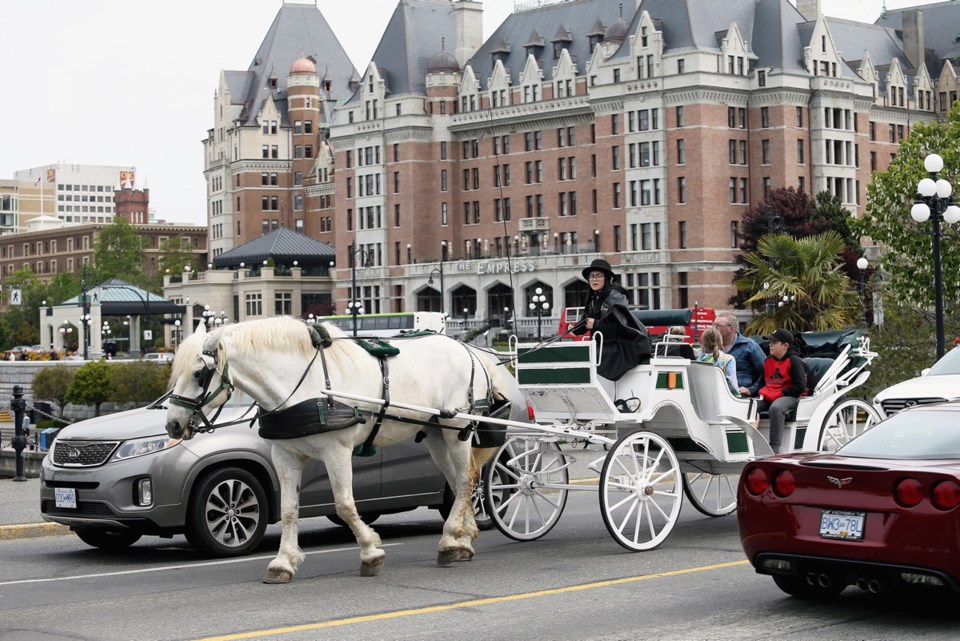Horse-drawn carriages should be banned from Victoria within four years, says Coun. Ben Isitt.
The city should develop regulations next year to phase out commercial horse-drawn carriage operations by 2023, Isitt says in a motion going to councillors this week.
“It’s just signaling that the era of horse-drawn carriages on the streets may be coming to a close. There’s many other opportunities that we can look to in the 21st century,” Isitt said Monday.
A number of factors are motivating the move, but “overall traffic safety on the streets for all users” — including horses, vehicle drivers, cyclists and pedestrians — is probably the main one, Isitt said.
“It’s always struck me as an outdated mode of transportation in a dense urban environment. So that’s the motivation. There are certainly animal welfare considerations as well.”
Coun. Charlayne Thornton-Joe, council’s most vocal proponent of animal welfare, expects Isitt’s resolution will elicit spirited debate. “I would like it to be focused on evidence-based [information] about whether the horses are being mistreated or whether this constitutes cruelty,” Thornton-Joe said, adding that carriage operators comply with all city regulations.
She said she meets with the SPCA every six months for updates on animal-welfare issues.
Council has implemented all the improvements to regulations surrounding horse-drawn carriages recommended by the SPCA, she said.
“For example, they said each horse had to be seen by a vet twice a year so that we would have a record of the health of the horse and so that no horse would be out there that is not in good health,” Thornton-Joe said, noting that there are also investigations of the horses’ stabling “so it’s not like everything looks good in public and then they go home and they’re in bad conditions.”
Thornton-Joe said carriages are restricted to less-congested areas and are not permitted to operate during morning and evening rush hours.
Some jurisdictions that have banned carriages took action due to congestion and rising temperatures, she said. “If I lived in New York City and had to deal with that traffic, if I was a councillor there, I would ban it.”
While council has been presented with petitions calling for a ban on horse-drawn carriages, Thornton-Joe said it was not an issue that gained traction during last year’s municipal election campaign.
As a replacement for the horse-drawn carriages, the tourism industry should explore the feasibility of “e-carriages” as vehicles for hire, Isitt’s motion says.
“I think there’s many opportunities for innovative and creative and fun forms of transportation geared toward tourists to provide interesting options that would be a part of the mix of mobility options for people visiting the city,” Isitt said.
In an email, Donna Friedlander, owner and operator of Tally-Ho Carriage Tours, said Isitt’s motion is based on his “own personal ideologies and is not based on facts or knowledge.”
“This motion misses the whole premise of a horse-drawn carriage experience. Our services are about providing the public an opportunity to interact with and learn about our amazing horses, slow down and experience life at an easy pace, and remember our historical roots,” Friedlander said.
“Take the horse out of the carriage, and all you have is an electric car — gone is the romance, the nostalgia and the positive impact horses have on society.”
Victoria’s horse-drawn industry “sets the tone for worldwide standards of care, ethics and operational management,” she said.
Last year, a video of two harnessed horses struggling to find their footing when they ended up lying on the pavement after the carriage they were pulling was bumped by a bus, prompted the SPCA to call for a ban on carriage operations.
However, in a subsequent letter, SPCA CEO Craig Daniell said his organization would welcome “a solutions-based policy approach that reviews existing practices, barriers and opportunities for horse-carriage operation.”
Erika Paul, SPCA animal protection and outreach officer, said her organization is no longer calling for a ban. “Whether council decides to phase them out, it’s entirely up to them. If they decide to keep them on the streets, to keep them working, then we would like some policies or operational procedures in place to ensure the safety of the horses.”



